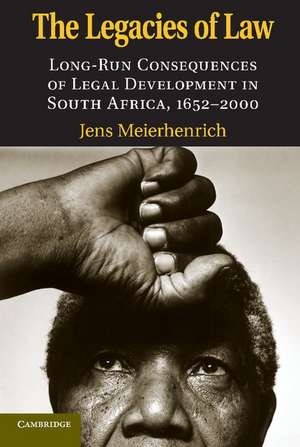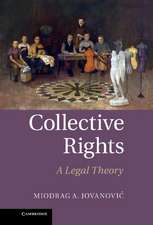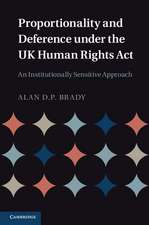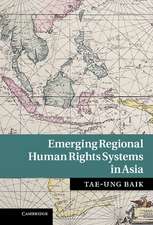The Legacies of Law: Long-Run Consequences of Legal Development in South Africa, 1652–2000
Autor Jens Meierhenrichen Limba Engleză Paperback – 20 iun 2010
| Toate formatele și edițiile | Preț | Express |
|---|---|---|
| Paperback (1) | 322.89 lei 6-8 săpt. | |
| Cambridge University Press – 20 iun 2010 | 322.89 lei 6-8 săpt. | |
| Hardback (1) | 678.74 lei 6-8 săpt. | |
| Cambridge University Press – 12 oct 2008 | 678.74 lei 6-8 săpt. |
Preț: 322.89 lei
Nou
Puncte Express: 484
Preț estimativ în valută:
61.79€ • 64.27$ • 51.01£
61.79€ • 64.27$ • 51.01£
Carte tipărită la comandă
Livrare economică 15-29 aprilie
Preluare comenzi: 021 569.72.76
Specificații
ISBN-13: 9780521156998
ISBN-10: 0521156998
Pagini: 406
Ilustrații: 16 tables
Dimensiuni: 152 x 229 x 23 mm
Greutate: 0.54 kg
Editura: Cambridge University Press
Colecția Cambridge University Press
Locul publicării:New York, United States
ISBN-10: 0521156998
Pagini: 406
Ilustrații: 16 tables
Dimensiuni: 152 x 229 x 23 mm
Greutate: 0.54 kg
Editura: Cambridge University Press
Colecția Cambridge University Press
Locul publicării:New York, United States
Cuprins
1. Introduction; Part I. A Theory of Law: 2. A typology of law; 3. Path dependence and the law; Part II. A History of Law: 4. Apartheid and the law I; 5. Apartheid and the law II; 6. Apartheid's endgame and the law I; 7. Apartheid's endgame and the law II; Part III. A Comparative Analysis: 8. A plausability probe; 9. Conclusion.
Recenzii
'South Africa's peaceful transition from apartheid to democracy has surprised many observers. In an innovative approach to this topic, Professor Jens Meierhenrich argues that existing legal norms and institutions have important structuring effects on transitions to democracy. He identifies the dichotomy between apartheid law's rational formalism and its irrational substance and asserts that this body of law 'was, in an important respect, necessary for making democracy work'. … The Legacies of Law offers an important account of the end of apartheid and expands the lessons of that experience to broader issues of democratization.' Harvard Law Review
'Meierhenrich's work provides an impressive synthesis of scholarly research on authoritarian transitions generally and dismantling of apartheid in particular … the work provides a strong historical and legal framework within which to understand how fundamentally illegitimate systems can function and ultimately even further the democratic process.' Law and Politics Book Review
'Meierhenrich's study is widely recognized by many specialists as an exceptional analysis of legal development in South Africa's democratization process since the mid-1600s, with emphasis on the apartheid era. … His careful - and unique - methodology creates a complex but useful analysis of South Africa's transition to democracy. … [T]he beneficiaries of this intellectually sophisticated analysis are primarily sophisticated scholars. … Summing up: highly recommended.' Choice
'Jens Meierhenrich has written a wonderfully ambitious, challenging book. It is, at once, a sweeping, quite original history of the role of legalities in the troubled South African past and a provocative conceptual work that lays the foundation for a theory of democracy rooted in the rule/s of law. An impressively erudite, transdisciplinary study - one with broad comparative relevance - it will have a major impact on scholarship in law and society. Everywhere.' John Comaroff, University of Chicago, American Bar Foundation
'In a highly scholarly work, that draws heavily on South African case law, legislation and legal literature, Jens Meierhenrich explores a contradiction in the South African apartheid state that informed South African jurisprudential discourse during the apartheid era. On the one hand, the apartheid regime invoked law as an instrument to impose and justify racial discrimination and political repression, but on the other hand it allowed relatively independent courts to administer justice in accordance with the enlightened values of the common law, a mix of English and Roman-Dutch law. Meierhenrich explains this contradiction in terms of a conflict between a prerogative state, which shows little respect for the rule of law, and a normative state, which respects the rule of law. His thesis, with wide philosophical underpinnings, provides a satisfactory explanation for the fact that when South Africa became a democracy in 1994 it was able to draw on its normative heritage in order to construct a model constitutional order.' John Dugard, Leiden University
'This is a highly original and unusual book. In it the author analyzes the legal institutions that played a role in the history of racism in South Africa from 1652 to 2000. It is directed to help explain the role of law in South Africa's extraordinary transition from Apartheid to democracy. It makes fascinating reading for anyone interested in the manner in which law plays a role in social transformation.' Richard Goldstone, former Justice of the Constitutional Court of South Africa
'Up to a few years ago most political scientists who studied law and courts knew nothing about comparative politics and most students of comparative politics knew nothing about law and courts. Now no student of either can afford to ignore the other. This book is central evidence for that proposition, essential reading for people in both fields, and an enormous step forward in our understanding of the role of legal institutions in political development in general and democratization in particular.' Martin Shapiro, James W. and Isabel Coffroth Professor of Law, University of California, Berkeley
'Drawing on Ernst Fraenkel's idea that some states combine the normative force of legality with the arbitrariness of prerogative, Jens Meierhenrich's examination of South Africa's transition to democracy illuminates fundamental questions about why - and, more important, how - the law's traditions can contribute to democratic stabilization even under apparently unfavorable conditions. More than an insightful analysis of an important case, this provocative work makes an important contribution to the theory of constitutional design.' Mark Tushnet, Harvard Law School
'In this provocative work, Jens Meierhenrich argues that the dual nature of the apartheid state - its combination of legalistic with repressive institutions - was essential to South Africa's transition to democracy. In showing how common legal traditions helped transform confrontation to cooperation, he sets a compelling research agenda for some time to come.' Elisabeth Jean Wood, Yale University
'Meierhenrich provides a compelling interpretation of the South African transition to full democracy. His argument is beyond doubt a major contribution to our understanding of this remarkable historical moment.' Crawford Young, University of Wisconsin, Madison
'Meierhenrich's work provides an impressive synthesis of scholarly research on authoritarian transitions generally and dismantling of apartheid in particular … the work provides a strong historical and legal framework within which to understand how fundamentally illegitimate systems can function and ultimately even further the democratic process.' Law and Politics Book Review
'Meierhenrich's study is widely recognized by many specialists as an exceptional analysis of legal development in South Africa's democratization process since the mid-1600s, with emphasis on the apartheid era. … His careful - and unique - methodology creates a complex but useful analysis of South Africa's transition to democracy. … [T]he beneficiaries of this intellectually sophisticated analysis are primarily sophisticated scholars. … Summing up: highly recommended.' Choice
'Jens Meierhenrich has written a wonderfully ambitious, challenging book. It is, at once, a sweeping, quite original history of the role of legalities in the troubled South African past and a provocative conceptual work that lays the foundation for a theory of democracy rooted in the rule/s of law. An impressively erudite, transdisciplinary study - one with broad comparative relevance - it will have a major impact on scholarship in law and society. Everywhere.' John Comaroff, University of Chicago, American Bar Foundation
'In a highly scholarly work, that draws heavily on South African case law, legislation and legal literature, Jens Meierhenrich explores a contradiction in the South African apartheid state that informed South African jurisprudential discourse during the apartheid era. On the one hand, the apartheid regime invoked law as an instrument to impose and justify racial discrimination and political repression, but on the other hand it allowed relatively independent courts to administer justice in accordance with the enlightened values of the common law, a mix of English and Roman-Dutch law. Meierhenrich explains this contradiction in terms of a conflict between a prerogative state, which shows little respect for the rule of law, and a normative state, which respects the rule of law. His thesis, with wide philosophical underpinnings, provides a satisfactory explanation for the fact that when South Africa became a democracy in 1994 it was able to draw on its normative heritage in order to construct a model constitutional order.' John Dugard, Leiden University
'This is a highly original and unusual book. In it the author analyzes the legal institutions that played a role in the history of racism in South Africa from 1652 to 2000. It is directed to help explain the role of law in South Africa's extraordinary transition from Apartheid to democracy. It makes fascinating reading for anyone interested in the manner in which law plays a role in social transformation.' Richard Goldstone, former Justice of the Constitutional Court of South Africa
'Up to a few years ago most political scientists who studied law and courts knew nothing about comparative politics and most students of comparative politics knew nothing about law and courts. Now no student of either can afford to ignore the other. This book is central evidence for that proposition, essential reading for people in both fields, and an enormous step forward in our understanding of the role of legal institutions in political development in general and democratization in particular.' Martin Shapiro, James W. and Isabel Coffroth Professor of Law, University of California, Berkeley
'Drawing on Ernst Fraenkel's idea that some states combine the normative force of legality with the arbitrariness of prerogative, Jens Meierhenrich's examination of South Africa's transition to democracy illuminates fundamental questions about why - and, more important, how - the law's traditions can contribute to democratic stabilization even under apparently unfavorable conditions. More than an insightful analysis of an important case, this provocative work makes an important contribution to the theory of constitutional design.' Mark Tushnet, Harvard Law School
'In this provocative work, Jens Meierhenrich argues that the dual nature of the apartheid state - its combination of legalistic with repressive institutions - was essential to South Africa's transition to democracy. In showing how common legal traditions helped transform confrontation to cooperation, he sets a compelling research agenda for some time to come.' Elisabeth Jean Wood, Yale University
'Meierhenrich provides a compelling interpretation of the South African transition to full democracy. His argument is beyond doubt a major contribution to our understanding of this remarkable historical moment.' Crawford Young, University of Wisconsin, Madison
Descriere
Focusing on South Africa from 1650–2000, Meierhenrich examines how law structures democracy in changing societies.












